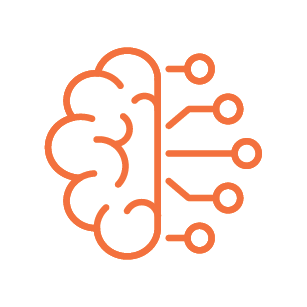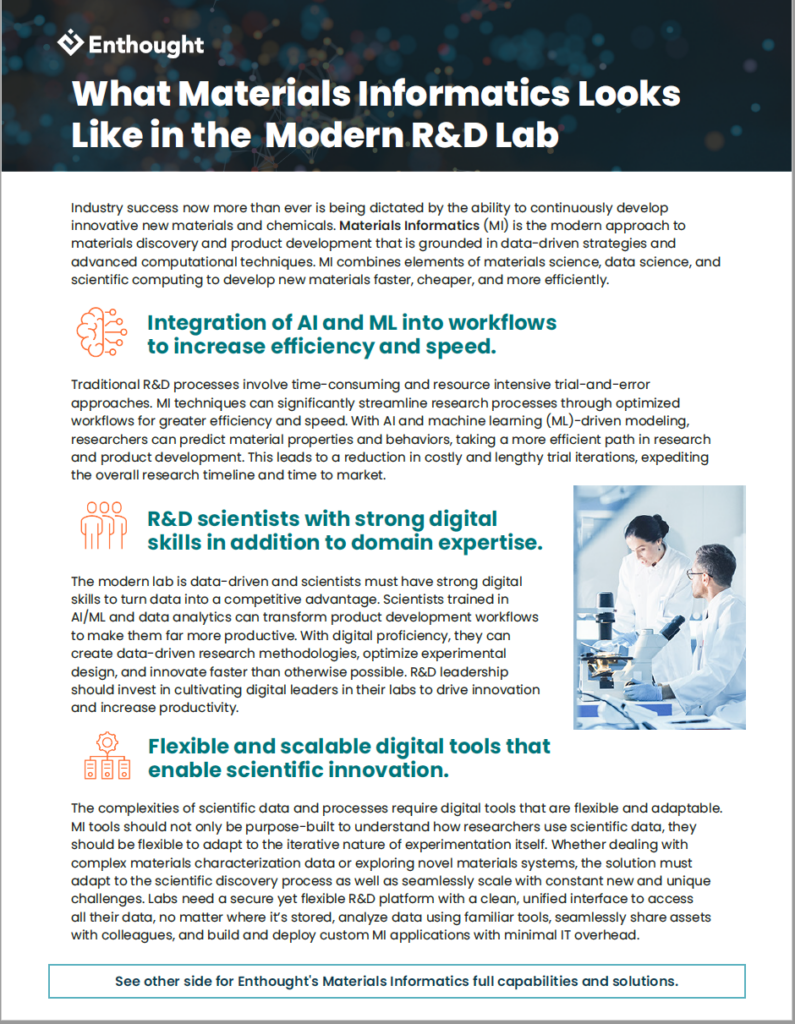The Modern Materials Science and Chemistry Lab
Industry success now more than ever is being dictated by the ability to continuously develop innovative new materials and chemicals, and companies are looking to Materials Informatics solutions as the key.
What is Materials Informatics? Materials Informatics (MI) is the modern approach to materials discovery and product development that is grounded in data-driven strategies and advanced computational techniques. MI combines elements of materials science, data science, and scientific computing to develop new materials faster, cheaper, and more efficiently.
MI can be applied to a variety of use cases, including: Property Prediction, Materials Discovery, Materials Development, Formulation Optimization, Structure Generation, Materials Compatibility, Materials Safety, Surrogate Modeling, Text Data Mining, Data Management, Data Augmentation, Automated Data Analysis, and Literature and Patent Search.
However, Material Informatics is more than applying a new technology or buying a new platform. Effectively implemented MI transforms people, processes—and technology.
Below is what MI in the modern R&D lab looks like.

Integration of AI and ML into workflows to increase efficiency and speed.
Traditional R&D processes involve time-consuming and resource intensive trial-and-error approaches. MI techniques can significantly streamline research processes through optimized workflows for greater efficiency and speed. With AI and machine learning (ML)-driven modeling, researchers can predict material properties and behaviors, taking a more efficient path in research and product development. This leads to a reduction in costly and lengthy trial iterations, expediting the overall research timeline and time to market.
![]()
R&D scientists with strong digital skills in addition to domain expertise.
The modern lab is data-driven and scientists must have strong digital skills to turn data into a competitive advantage. Scientists trained in AI/ML and data analytics can transform product development workflows to make them far more productive. With digital proficiency, they can create data-driven research methodologies, optimize experimental design, and innovate faster than otherwise possible. R&D leadership should invest in cultivating digital leaders in their labs to drive innovation and increase productivity.
Learn how top materials company Idemitsu transformed their scientists through Enthought's unique Materials Informatics Acceleration Program.

Flexible and scalable digital tools that enable scientific innovation.
The complexities of scientific data and processes require digital tools that are flexible and adaptable. MI tools should not only be purpose-built to understand how researchers use scientific data, they should be flexible to adapt to the iterative nature of experimentation itself. Whether dealing with complex materials characterization data or exploring novel materials systems, the solution must adapt to the scientific discovery process as well as seamlessly scale with constant new and unique challenges. Labs need a secure yet flexible R&D platform with a clean, unified interface to access all their data, no matter where it’s stored, analyze data using familiar tools, seamlessly share assets with colleagues, and build and deploy custom MI applications with minimal IT overhead.
Learn about Enthought Edge, the cloud-native platform purpose-built for R&D and complex scientific data.
![]() Looking to accelerate your research by leveraging Material Informatics? Enthought understands the complexities of scientific data and can help. Contact us to connect with one of our experts.
Looking to accelerate your research by leveraging Material Informatics? Enthought understands the complexities of scientific data and can help. Contact us to connect with one of our experts.
Related Content
Digital Transformation vs. Digital Enhancement: A Starting Decision Framework for Technology Initiatives in R&D
Leveraging advanced technology like generative AI through digital transformation (not digital enhancement) is how to get the biggest returns in scientific R&D.
Digital Transformation in Practice
There is much more to digital transformation than technology, and a holistic strategy is crucial for the journey.
Leveraging AI for More Efficient Research in BioPharma
In the rapidly-evolving landscape of drug discovery and development, traditional approaches to R&D in biopharma are no longer sufficient. Artificial intelligence (AI) continues to be a...
Utilizing LLMs Today in Industrial Materials and Chemical R&D
Leveraging large language models (LLMs) in materials science and chemical R&D isn't just a speculative venture for some AI future. There are two primary use...
Top 10 AI Concepts Every Scientific R&D Leader Should Know
R&D leaders and scientists need a working understanding of key AI concepts so they can more effectively develop future-forward data strategies and lead the charge...
Why A Data Fabric is Essential for Modern R&D
Scattered and siloed data is one of the top challenges slowing down scientific discovery and innovation today. What every R&D organization needs is a data...
Jupyter AI Magics Are Not ✨Magic✨
It doesn’t take ✨magic✨ to integrate ChatGPT into your Jupyter workflow. Integrating ChatGPT into your Jupyter workflow doesn’t have to be magic. New tools are…
Top 5 Takeaways from the American Chemical Society (ACS) 2023 Fall Meeting: R&D Data, Generative AI and More
By Mike Heiber, Ph.D., Materials Informatics Manager Enthought, Materials Science Solutions The American Chemical Society (ACS) is a premier scientific organization with members all over…
Real Scientists Make Their Own Tools
There’s a long history of scientists who built new tools to enable their discoveries. Tycho Brahe built a quadrant that allowed him to observe the…
How IT Contributes to Successful Science
With the increasing importance of AI and machine learning in science and engineering, it is critical that the leadership of R&D and IT groups at...
